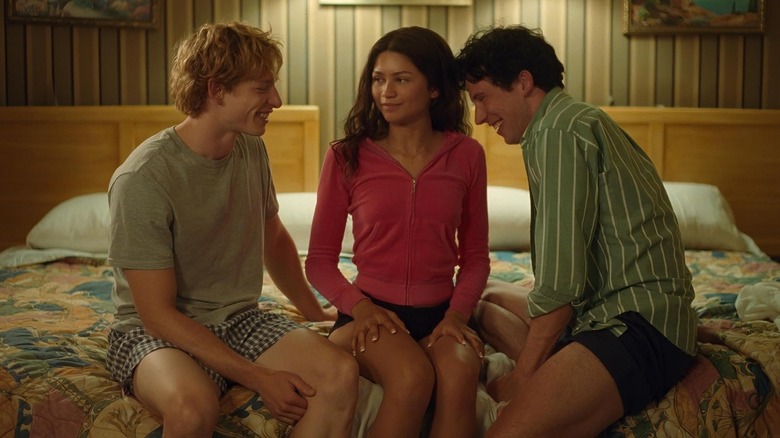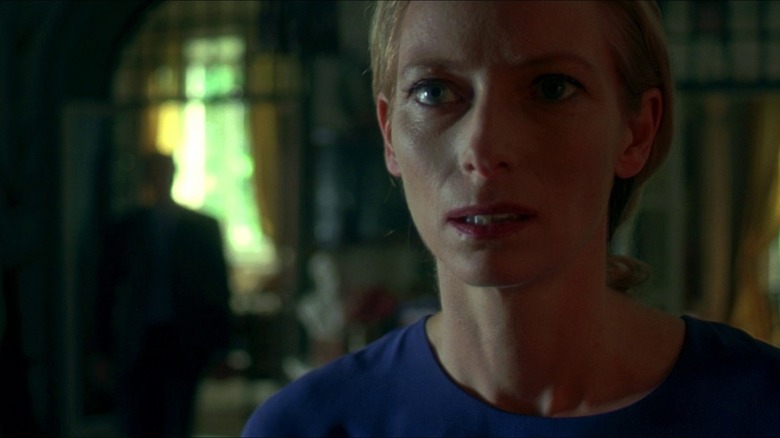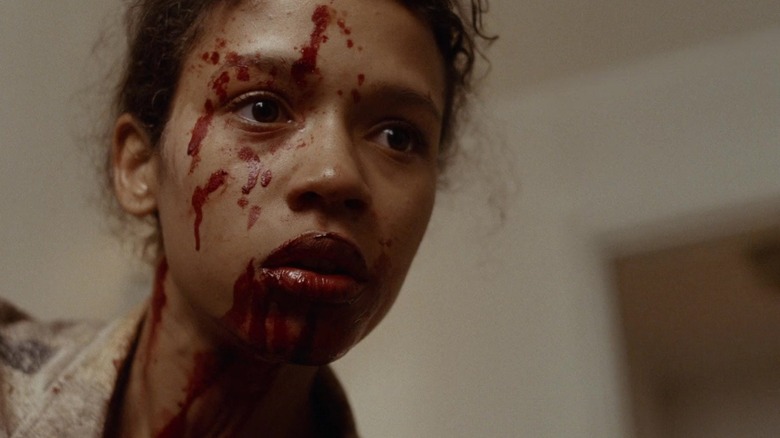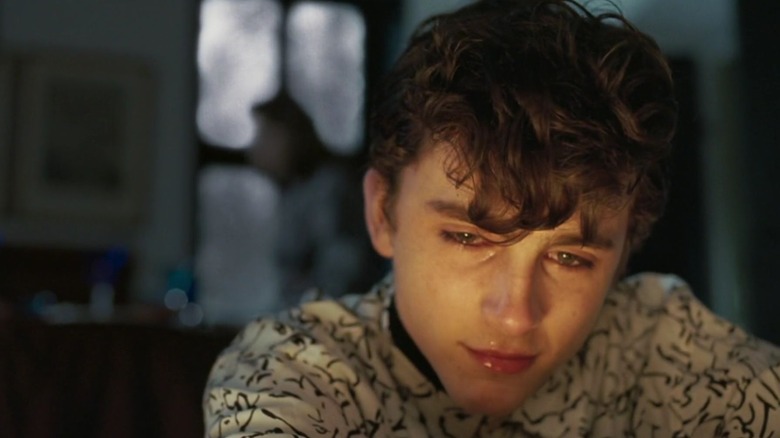The 5 Best Luca Guadagnino Movies, Ranked
Oscar-nominated filmmaker Luca Guadagnino knows how to make a goddamn movie. That was clear to fans of his earlier works, like the sumptuous "I Am Love," more than a decade ago. It was clear to most other people about five years ago when the bold one-two punch of "Call Me By Your Name" and "Suspiria" made moviegoers sit up and pay attention. And it's more clear than ever now, with the release of the director's latest (and reportedly biggest-budgeted) effort, the endlessly thrilling Zendaya-led sports drama "Challengers." Film after film, Guadagnino manages to tap into some hidden corners of our hearts by telling stories that are evocative and colorful, musical and sensual, messy and true.
Though Guadagnino has gained more attention in recent years, the filmmaker has actually been working since the '90s and has by now made eight narrative (or meta-narrative) features, a TV show, and several documentaries and shorts. For the sake of streamlining this list, we've excluded anything that can be constituted as a short film, an early documentary that seems to have never been released with English subtitles, and the compelling, complicated HBO show "We Are Who We Are," but the rest of his work is fair game. Fortunately for film lovers, the filmmaker has a full slate ahead of him, which means this ranking will surely change once projects that are still in the works, like "Queer" and "The Lord of the Flies," have been released. In the meantime, here are the five best Luca Guadagnino movies so far.
5. I Am Love
Guadagnino's 2009 portrait of a wealthy family seeking purpose in unusual places is the first truly great work of his career. It's not the first time he's claimed Tilda Swinton as his muse (that would be in "The Protagonists," a messy, avant-garde docufiction film from 1999 that was his first feature), but it's the first time he unlocks her full potential as an actor. Here, Swinton plays Emma Recchi, the stifled daughter-in-law to a textile company magnate who's on his way out. At first blush, the film seems like it's going to be a gauzy, beautiful, "Succession"-like story about patriarchal disapproval among the wealthy, but it soon begins spinning in a different, gentler direction.
"I Am Love" unfolds languidly over the course of two hours, telling the stories of Emma — a Russian expat whose sense of personal history was squeezed out of her when she joined the Recchi — and her children while trusting audiences to connect the thematic dots between them. It's no wonder Guadagnino calls this film the beginning of his "desire" trilogy: characters here are defined by their desire, a pining for something (food, sex, love, beauty) that tilts over into indulgence over the course of the film.
While some of the filmmaker's later works are best known for their indelible lines, "I Am Love" says what matters most without words, executing several twists of fate wholly through imagery and carefully controlled performances from Swinton, Flavio Parenti (who plays her eldest son and the company's heir apparent), and Edoaro Gabbriellini (as a chef whose work awakens something in her). "I Am Love" is a deceptively slight story with an iceberg of unspoken emotion welling beneath its surface.
4. A Bigger Splash
Before "The White Lotus" season 2 made wealthy people vacationing in Italy all the rage, Guadagnino's sun-soaked adaptation of "La Piscine" luxuriated in a close look at the lives of the rich and dissatisfied. The film roughly follows the structure of Jacques Deray's 1969 movie (which is also called "The Swimming Pool"), but injects it with some thrilling details. This time around, vacationing couple Marianne (Tilda Swinton) and Paul (Matthias Schoenaerts) have a relationship defined by what it isn't: she's a major star in the music world on vocal rest after surgery, while he's the sober and boring-seeming filmmaker she's built a life with. Their quiet, slightly ill-at-ease companionship is disrupted almost immediately by the arrival of Harry Hawkes (Ralph Fiennes), an obnoxious force of a man who has a complex history with both parties.
Fiennes' performance here is both incredible and exhausting. As the impulsive and brash former record producer wheedles his way between the two lovers, it soon becomes clear that their idyllic getaway is no longer private. Complicating matters further is the addition of Penelope (Dakota Johnson), Harry's long-lost daughter who seems inclined to rock the boat and has a boundary-pushing relationship with her dad. "A Bigger Splash" feels at once riveting and aimless, until a scene two-thirds of the way into the film suddenly throws its themes of jealousy, immature desire, and self-destruction into focus. Guadagnino's wisest choice here is not focusing on what happens to these characters, but on how they allow themselves (or don't) to feel about one another. Those feelings bleed through in striking ways that would soon become the filmmaker's signature: through food and drink, laid-back vacation excursions, ambiguous touches, and, of course, music and dance. Fiennes' all-in, one-man dance sequence is the centerpiece of the film — a scene that undeniably makes a big splash.
3. Bones and All
Beautiful and almost unbearably grim, "Bones and All" is much more than the "cannibal romance" it was marketed as. The movie stars Timothée Chalamet and Taylor Russell as a pair of young people forced to wander and run after their insatiable urge to eat human flesh gets the better of them. It builds out a surprisingly vast and uncanny fantasy world in which "eaters" can smell one another but never eat one another, and are forced to scavenge, murder, and relocate regularly to keep their powerful hereditary habit going.
"Bones and All" is an evocative, strange movie with a central theme that could be a stand-in for multiple things. In some scenes, the disgust non-eater family members feel at their cannibal children's unchangeable disposition feels like a metaphor for queerness, while the pair's genetic problem and rejection by society call to mind the experience of living with mental illness or addiction. No matter which way you slice it, "Bones and All" is as profoundly heartbreaking as it is hypnotically repulsive, brimming with tragedy as much as horror.
Guadagnino once again demonstrates his knack for casting relative unknowns in (excuse the pun) meaty roles here, as he trains the camera on Russell for what turns out to be a staggeringly great performance. Chalamet rises to meet her, and the pair are matched in their talent by Mark Rylance, who puts in a truly horrifying performance as a very particular type of boundary-pushing oddball. Gorgeous and somber, with a "Badlands"-style spirit and a willingness to push at the bruises of our cultural taboos, "Bones and All" saw the filmmaker taking major risks that paid off marvelously.
2. Call Me By Your Name
The film that made Guadagnino nearly a household name may have topped this list a few years ago before rewatches of it were recontextualized by lurid allegations against co-star Armie Hammer and valid questions about its romanticized central age gap (the movie is based on André Aciman's novel of the same name, and the author has expressed overtly disturbing views). Still, "Call Me By Your Name" remains a feat of filmmaking, one that captures the dazzling drama and desire of a first relationship through the eyes of a teen who is perhaps too naive to contextualize his own experiences — or think beyond the next time he'll be able to share a fumbling, heady moment of intimacy with his older lover.
Here, Guadagnino harnesses the tremendous power of a first queer crush and never allows its dizzying effects to dissipate. Elio (Chalamet, giving an incredible breakthrough performance) is an intelligent, horny teen who's spending his summer in Italy, where he escapes the mundane security of his parents' academic world by falling into the orbit of their visiting grad student (Hammer). Guadaganino told stories about precocious teens' trust being exploited by older crushes both before ("Melissa P.") and after this ("We Are Who We Are"), but this time around, he and screenwriter James Ivory imagine a dreamy first love without the rough edges: soft, exhilarating, and still tinged by sweetness even when the heartache eventually, inevitably comes.
More than anything, "Call Me By Your Name" is proof that Guadagnino is capable of coaxing deeply human performances out of his casts, allowing them to cultivate a level of vulnerability and intimacy that's rarely shown on screen. Whether it's Chalamet sobbing by the fireplace or Michael Stuhlbarg bringing down the house with his final monologue, "Call Me By Your Name" contains some of the most acutely emotional screen work of the past decade.
1. Challengers
With his latest feature, Guadagnino finally leans into his tendency towards melodrama, and the results are incredible. "Challengers" may be the filmmaker's most widely accessible project to date, but with it, he refuses to water down his gorgeously complex view of the human condition. A script by Justin Kuritzkes adds darkly funny brutality to a tangled story of love and friendship between three tennis players (Zendaya, Josh O'Connor, and Mike Faist), and Guadagnino brings the whole f**ked-up affair to life with a mix of style, savagery, and subtle characterization.
In the simplest of terms, "Challengers" follows an emotionally fraught rematch between two former best friends, one a professional tennis player and one a lesser competitor, 13 years after their pursuit of junior tennis champ Tashi (Zendaya) tore them apart. The movie is anything but simple, though, as it alternates flashier showdowns and blow-ups with telling moments of accidental intimacy between each configuration of partners. While most sports movies focus on who deserves the win, "Challengers" loads its players up with sins and secrets, then lets them work through their hidden shame by whacking a ball until sweat pours off them.
"Challengers" has a talented cast and stunningly structured script, but it's Guadagnino who brings its loftier elements down to earth by focusing on the hearts, minds, and athletic bodies of these people who can't stop making one another hurt. He tells the epic story of this trio's magnetic attraction (and repulsion) via shared foods, slight gestures, and fumbling collisions, once again laying bare everything these characters can't or won't say through a distinctive, powerful visual language. Body language and physicality don't just enrich this movie — they define it. "Challengers" is a beautifully cold melodrama shot through with the unignorable warmth of Guadagino's vision, and it's that contrast that makes it ultimately light up brighter than anything he's done before.





